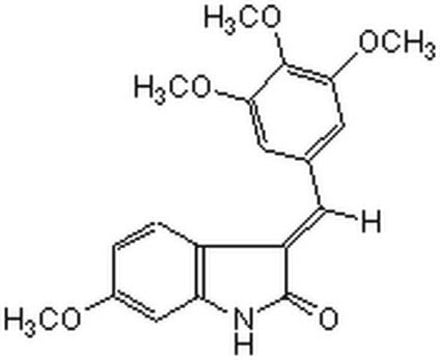17-10194
In Vitro Tubulin Polymerization Assay Kit (≥99% Pure Bovine Tubulin)
This In vitro Tubulin Polymerization Assay Kit used >99% pure bovine tubulin to allow for quick and quantitative determination of tubulin polymerization.
Synonym(s):
tubulin polymerization, bovine tubulin
Sign Into View Organizational & Contract Pricing
All Photos(1)
About This Item
UNSPSC Code:
12352207
eCl@ss:
32161000
NACRES:
NA.84
Recommended Products
manufacturer/tradename
Chemicon®
technique(s)
activity assay: suitable
shipped in
ambient
General description
Introduction
Microtubules are long, hollow cylinders made up of polymerised α- and β-tubulin dimers. Tubulin dimers polymerize end to end in protofilaments which are the building block for the microtubule structure. Microtubules are part of a structural network (the cytoskeleton) within the cell′s cytoplasm. The primary role of the microtubule cytoskeleton is mechanical. However, in addition to structural support, microtubules also take part in many other processes. A microtubule is capable of growing and shrinking in order to generate force, and there are also motor proteins that allow organelles and other cellular factors to be carried along a microtubule.
Tubulin is a highly-conserved major component of eukaryotic cells and the ‘building block’ of microtubules. Tubulin is a heterodimer of α and β subunits with an apparent molecular mass of ~110 kDa. In vivo and in vitro, in the presence of GTP, tubulin heterodimers can polymerize (assemble) to form microtubules.
Many proteins or small-molecule compounds affect microtubule assembly. EMD Millipore’s In vitro Tubulin Polymerization Assay Kit allows for quick and quantitative determination of tubulin polymerization due to protein and compound-based modulation.
Microtubules are long, hollow cylinders made up of polymerised α- and β-tubulin dimers. Tubulin dimers polymerize end to end in protofilaments which are the building block for the microtubule structure. Microtubules are part of a structural network (the cytoskeleton) within the cell′s cytoplasm. The primary role of the microtubule cytoskeleton is mechanical. However, in addition to structural support, microtubules also take part in many other processes. A microtubule is capable of growing and shrinking in order to generate force, and there are also motor proteins that allow organelles and other cellular factors to be carried along a microtubule.
Tubulin is a highly-conserved major component of eukaryotic cells and the ‘building block’ of microtubules. Tubulin is a heterodimer of α and β subunits with an apparent molecular mass of ~110 kDa. In vivo and in vitro, in the presence of GTP, tubulin heterodimers can polymerize (assemble) to form microtubules.
Many proteins or small-molecule compounds affect microtubule assembly. EMD Millipore’s In vitro Tubulin Polymerization Assay Kit allows for quick and quantitative determination of tubulin polymerization due to protein and compound-based modulation.
Application
EMD Millipore’s In vitro Tubulin Polymerization Assay Kit allows for quick and quantitative determination of tubulin polymerization due to protein and compound-based modulation.
Research Category
Cell Structure
Cell Structure
Research Sub Category
Cytoskeleton
Cytoskeleton
Components
≥99% Pure Bovine Tubulin: 2 vials of 130 µL (240 µM) each of ≥99% pure bovine tubulin stock solution in 1X polymerization buffer (PB) containing 1mM GTP.
Polymerization Buffer (PB) 5X: One vial containing 300 µL 5X polymerization buffer.
200mM GTP: 1 vial containing 10 µL of 200 mM GTP.
One 96-well half area plate.
Paclitaxel: One vial containing 10 µL of 700 µM paclitaxel in DMSO.
Nocodazole: One vial containing 10 µL of 700 µM nocodazole in DMSO.
Polymerization Buffer (PB) 5X: One vial containing 300 µL 5X polymerization buffer.
200mM GTP: 1 vial containing 10 µL of 200 mM GTP.
One 96-well half area plate.
Paclitaxel: One vial containing 10 µL of 700 µM paclitaxel in DMSO.
Nocodazole: One vial containing 10 µL of 700 µM nocodazole in DMSO.
Storage and Stability
Store tubulin stock solution at -80°C, store all other components at -20°C for up to 4 months from date of receipt. Do not freeze and thaw.
Legal Information
CHEMICON is a registered trademark of Merck KGaA, Darmstadt, Germany
Disclaimer
Unless otherwise stated in our catalog or other company documentation accompanying the product(s), our products are intended for research use only and are not to be used for any other purpose, which includes but is not limited to, unauthorized commercial uses, in vitro diagnostic uses, ex vivo or in vivo therapeutic uses or any type of consumption or application to humans or animals.
Signal Word
Warning
Hazard Statements
Precautionary Statements
Hazard Classifications
Eye Irrit. 2 - Met. Corr. 1 - Skin Irrit. 2
Storage Class Code
8A - Combustible corrosive hazardous materials
Certificates of Analysis (COA)
Search for Certificates of Analysis (COA) by entering the products Lot/Batch Number. Lot and Batch Numbers can be found on a product’s label following the words ‘Lot’ or ‘Batch’.
Already Own This Product?
Find documentation for the products that you have recently purchased in the Document Library.
Sarah A Yunes et al.
PloS one, 17(6), e0268857-e0268857 (2022-06-16)
Factor quinolinone inhibitors (FQIs), a first-in-class set of small molecule inhibitors targeted to the transcription factor LSF (TFCP2), exhibit promising cancer chemotherapeutic properties. FQI1, the initial lead compound identified, unexpectedly induced a concentration-dependent delay in mitotic progression. Here, we show
Our team of scientists has experience in all areas of research including Life Science, Material Science, Chemical Synthesis, Chromatography, Analytical and many others.
Contact Technical Service









